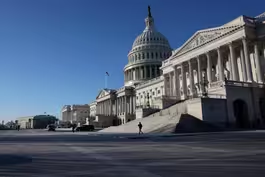
Case involving a fish could curtail federal regulations
Clip: 1/17/2024 | 6m 34sVideo has Closed Captions
How a case involving a small fish could have big implications on federal regulations
The Supreme Court heard arguments about whether a group of East Coast fishermen should be required to pay for a costly monitoring system on their boats. The fishermen are being supported by industry groups who want to curtail government regulation and the outcome could have enormous impacts far beyond the fishing industry. William Brangham discussed the case with Carrie Johnson of NPR.
Problems playing video? | Closed Captioning Feedback
Problems playing video? | Closed Captioning Feedback
Major corporate funding for the PBS News Hour is provided by BDO, BNSF, Consumer Cellular, American Cruise Lines, and Raymond James. Funding for the PBS NewsHour Weekend is provided by...

Case involving a fish could curtail federal regulations
Clip: 1/17/2024 | 6m 34sVideo has Closed Captions
The Supreme Court heard arguments about whether a group of East Coast fishermen should be required to pay for a costly monitoring system on their boats. The fishermen are being supported by industry groups who want to curtail government regulation and the outcome could have enormous impacts far beyond the fishing industry. William Brangham discussed the case with Carrie Johnson of NPR.
Problems playing video? | Closed Captioning Feedback
How to Watch PBS News Hour
PBS News Hour is available to stream on pbs.org and the free PBS App, available on iPhone, Apple TV, Android TV, Android smartphones, Amazon Fire TV, Amazon Fire Tablet, Roku, Samsung Smart TV, and Vizio.
Providing Support for PBS.org
Learn Moreabout PBS online sponsorshipof Atlanta -- Atlantic herring fishermen# should be required to pay for a cost monitoring system on their boats, or whether# that requirement is governmental overreach.
But, as William Brangham reports,# the outcome of this case could have## enormous impacts far beyond the fishing industry.
WILLIAM BRANGHAM: At issue here is# what's called the Chevron deference.## It's named after the oil and gas company# whose case created this legal prec It says, if there is a dispute over some ambiguous# regulation, the deference should go to the## government agency whose experts wrote the rule.# That's what those fishermen are arguing against,## and they're being supported by industry# groups who also want to curtail regulation.
If Chevron is knocked down, it could upend rules# governing nearly every slice of American society,## health care, environmental and workplace# protections, public education, banking, and more.
To understand what's at stake, we are# joined again by NPR's Carrie Johnson,## who was at the court for today's arguments.
Carrie, thank you so much for being back again.
Sticking with this fishermen's case,## can you explain what the arguments were i CARRIE JOHNSON, NPR: These plaintiffs are# a small group of fishermen based in the## Northeastern United States.
And a few years ago,# the Fisheries Service basically requiring them to have professional# observers or monitors on their boats, sometimes## on an overnight basis, to make sure they were# following the rules, and a decree that they should## have to pay for the monitors to the tune of about# $700 a day, which they say is just too much money.
They say it was never clear that# Congress intended for them to have## to pay.
And so they took this case# all the way to the Supreme Court,## arguing that the federal agency# here had overreached against them.
WILLIAM BRANGHAM: I see.
it might be onerous on the fishermen, but that's# the rule, and the agency gets to determine that.
CARRIE JOHNSON: That's right.
In this case, the lower courts ma ndate under the law that these fishermen# would have to pay.
They firmly resisted that## and took this case all the way up to the# Supreme Court, where it ended up today.
WILLIAM BRANGHAM: So you can see why# business interests don't like this## idea of some agency basically winning every# toss-up ball over a fight over Wh at is their broader argument# about this deference principle?
CARRIE JOHNSON: Ultimately, they say that# this is a matter of the executive branch## of the government, unelected federal# bureaucrats, taking power that should## belong to the United States Congress# and, to some extent, to federal judges,## who all along have interpreted the law# and who can interpret these laws and## these regulations just fine on their own# without any input from federal agencies.
And they say that, for many years now, almost 40# of them since this case was decided back in 1984,## it's really upended the balance# of power between the branches,## and it's put a lot of onus on small businesses# like these fishermen and oth themselves against federal agencies,# when they have a hard time winning there.
This case was supported not just by these# small fishing industries, but a number of## very large conservative legal foundations,# groups like the Gun Owners of America,## a trade group for e-cigarette manufacturers and# others, just showing how sweeping this case could## be if the Supreme Court ultimately decides to# overrule that precedent from all those years ago.
WILLIAM BRANGHAM: Let's talk# a little bit about that,## because the opponent consumer protection groups, and others like that,# argue that this would, in essence, sow chaos.
What is their argument?
Why do# they say Chevron should stay?
CARRIE JOHNSON: They basically argue# that there's a hidden agenda in this## case beyond the herring fishermen, who are# the plaint to paralyze or cripple the bureaucracy, so# that federal agencies cannot make rules on## major problems in American life, things# from air pollution and maybe eventually## even artificial intelligence, as Justice# Elena Kagan raised today, to health care.
And they say, if you return these decisions# to the hands of unelected federal judges,## there's something like 800 of them# around the country, it risks people's## Medicare and Medicaid programs, very complex# programs that mean a lot to people's lives,## being decided one way in one state and one# way -- in another way in another state.
And that could really sow chaos for people's lives# just in their personal pocketbooks, as well as## for environmental regulations and workplace# protections.
You just can't have a system## where the regs mean something in one state and# mean something else halfway around the country.
WILLIAM BRANGHAM: I know that,# in his confirmation hearings,## now-Justice Gorsuch expressed a great# deal of skepticism, and I know ot her conservative justices similarly# have shown some antipathy to regulation.
From your reading of the arguments today,# what is your sense?
Do you think the majority,## the conservative majority,# is going to strike it down?
CARRIE JOHNSON: We did hear# deep skepticism from justice## Neil Gorsuch today.
He raised a lot# of very, very tough qu solicitor general.
And Justice Brett# Kavanaugh was also pretty skeptical,## Justice Sam Alito along the same lines.
And# Clarence Thomas asked a few questions too.
But those, William, are four votes, and I didn't# hear a clear fifth vote for getting rid of this## precedent altogether.
In fact, one of the Trump# appointees, Justice Amy Coney Barrett, raised the## specter of getting rid of this precedent might# mean inviting floodgates of litigation from## thousands of litigants who have had their cases# decided based on this principle over many years,## and that really swamping the courts and# potentially the Justice Department too.
So it's not clear to me there are five votes# to overturn this precedent altogether.
It may be that the court compromises and chips# away further at the precedent, though.
WILLIAM BRANGHAM: All right, Carrie# Johnson of NPR, thank you, as always.
CARRIE JOHNSON: My pleasure.
Artist reflects on natural beauty with a knife and paper
Video has Closed Captions
Clip: 1/17/2024 | 7m 21s | Artist reflects on the natural beauty of the Pacific Northwest with a knife and paper (7m 21s)
Congress, White House negotiate Ukraine and border funding
Video has Closed Captions
Clip: 1/17/2024 | 4m 36s | What’s in the way of a deal as Congress, White House negotiate Ukraine and border funding (4m 36s)
Former NATO head on U.S. debate over Ukraine military aid
Video has Closed Captions
Clip: 1/17/2024 | 6m 51s | Former NATO chief on what's at stake as U.S. debates military aid for Ukraine (6m 51s)
Growing number of men say they are in a friendship recession
Video has Closed Captions
Clip: 1/17/2024 | 8m 13s | Why a growing number of American men say they are in a 'friendship recession' (8m 13s)
Schools work to help students amid chronic absenteeism rise
Video has Closed Captions
Clip: 1/17/2024 | 5m 21s | School leaders work to keep students in class amid rise in chronic absenteeism (5m 21s)
U.S. official overseeing Yemen discusses response to Houthis
Video has Closed Captions
Clip: 1/17/2024 | 7m 34s | State Department official overseeing Yemen discusses U.S. response to Houthi attacks (7m 34s)
Providing Support for PBS.org
Learn Moreabout PBS online sponsorship
- News and Public Affairs

FRONTLINE is investigative journalism that questions, explains and changes our world.

- News and Public Affairs

Amanpour and Company features conversations with leaders and decision makers.












Support for PBS provided by:
Major corporate funding for the PBS News Hour is provided by BDO, BNSF, Consumer Cellular, American Cruise Lines, and Raymond James. Funding for the PBS NewsHour Weekend is provided by...





